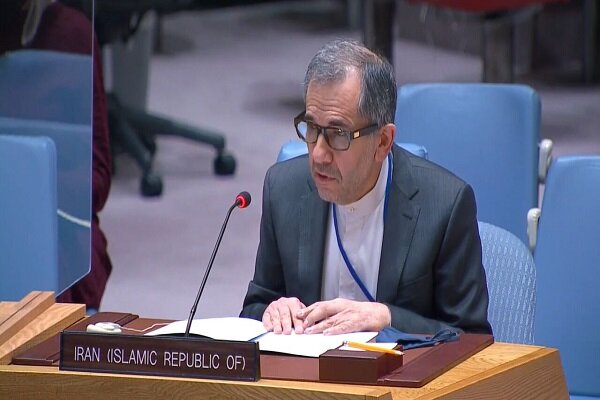War on terrorism should never be pretext to erode Syrian sovereignty: envoy

TEHRAN- The Syrian crisis cannot be handled without ending the occupation and eliminating terrorist threats, according to Iran's permanent envoy to the United Nations, who also warned that the fight against terrorism must not be used to undermine Syria's sovereignty and territorial integrity.
Majid Takht Ravanchi, speaking at a UN Security Council meeting on political and humanitarian developments in Syria on Tuesday, said that Syria's humanitarian needs have reached an all-time high since the conflict began more than a decade ago, and that the recent report of the UN Secretary General indicates that 14.6 million people are in need of humanitarian assistance, up 1.2 million from 2021.
Acute and quick economic downturns, as well as climate-related consequences, have emerged as new main drivers of humanitarian needs, according to the same research, as Ravanchi stated.
The Iranian ambassador stated that unilateral coercive efforts against the Syrian people have had terrible implications in all parts of the Syrian people's lives, and that the measures must be stopped.
Here is the full text of Ravanchi’s statement:
“Madame President,
I thank the briefers for their insightful briefings.
Since the conflict began more than a decade ago, Syria's humanitarian needs have reached an all-time high. The recent SG’s report indicates that 14.6 million people are in need of humanitarian assistance, an increase of 1.2 million from 2021. According to the same report, acute and rapid economic downturns, as well as climate-related impacts, have emerged as new major drivers of humanitarian needs. The current economic crisis has impacted civilians across the country, particularly children, women, the elderly, and those with disabilities.
Given the dire humanitarian situation, it is more vital than ever to end unilateral coercive measures against the Syrian people. These illegal measures have had disastrous consequences in all aspects of people’s lives and run counter to the Security Council resolution 2585 relating to early recovery projects.
In his report, the Secretary-General has called for waiving of sanctions that are preventing access to critical health supplies, COVID-19-related medical assistance, and food. In this context, it is necessary that the ongoing technical dialogue on sanctions and humanitarian operations in the Syria Arab Republic between the relevant Member States and humanitarian actors provide solutions to the challenges that several humanitarian actors in the country face in ensuring adequate and reliable access to financial services.
As emphasized in the SG’s report, current humanitarian relief efforts should focus on supporting early recovery and reconstruction projects, ensuring the continuous operations of water, electricity, education, and medical facilities, and the provision of basic services, as mandated by Resolution 2585 (2021).
Therefore, the Security Council must work diligently to ensure that resolution 2585 is properly implemented in a balanced and effective manner, particularly in terms of early recovery projects and the lifting of unilateral sanctions.
At the same time, political conditions should not be allowed to block early recovery projects as well as humanitarian assistance. We commend the Syrian government’s, United Nations agencies, and humanitarian partners' efforts to expand the scope and frequency of humanitarian relief operations on a continual basis.
In this context, we salute the UN agencies for successfully completing the third cross-line delivery to Sarmada since the adoption of Security Council Resolution 2585 in July 2021.
We reiterate our call for ending the plunder of Syria’s natural resources, particularly oil and agricultural products, by foreign forces. This criminal act not only violates Syrian territorial sovereignty, relevant Security Council resolutions, and the United Nations Charter, but also has a negative impact on efforts and measures aimed at restoring the Syrian economy.
We support the initiatives to facilitate the repatriation of refugees and internally displaced persons and are willing to provide assistance for the success of such endeavors.
After more than a decade of conflict in Syria, it has become evident that only one solution exists: a Syrian-led, Syrian-owned political process facilitated by the UN.
We support the continuation of inter-Syrian talks in Geneva. We warmly welcome the convening of the Constitutional Committee's seventh session. We also commend Mr. Pedersen's efforts to streamline the process.
We reiterate that the Committee must work in strict accordance with its Terms of Reference and Rules of Procedure, free from outside interference or pressure, and with no artificial timetables. This must be a fully Syrian-led and Syrian-owned effort and the UN role should be limited to facilitation
We are looking forward to the next meeting of the committee, which will be held in the second half of May. We hope that by working efficiently, independently, and without outside intervention, the Constitutional Committee will produce positive results.
The Syrian crisis cannot be resolved without putting an end to the occupation and uprooting the terrorist threats.
We once again reaffirm our commitment to Syria's sovereignty, territorial integrity, unity, and political independence and its efforts to combat terrorism.
We strongly condemn the Israeli regime's repeated violations of Syria's sovereignty and territorial integrity. We call on the Security Council to hold this regime accountable for such acts of aggression and malice, as well as its blatant threats to use force against other regional countries, endangering regional peace and security.
The war against terrorism must not be used to undermine Syria's sovereignty and territorial integrity. The illegal presence of foreign forces in parts of Syria, which has created ideal conditions for terrorist activities, must end immediately.
We maintain our contacts with the Syrian government, the UN Special Envoy, and our partners in the Astana format in order to help end the crisis and alleviate the suffering of the Syrian people as soon as possible.”
